Few Short Stories.
@ Pratip Bhattacharya, 1986 Civil Engineering
Following few stories are outcome of the classical BE College Adda. Atin is the character and also a storyteller, and the stories are based on the campus life of a few true BE Collegians.
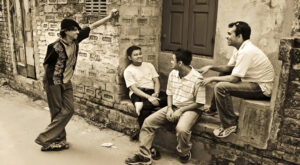
Atin, my college junior, a highly intelligent man, is frivolous and mischievous to the core. A typical B.E. College product. He is the source of short stories, and he tells them as if all are not mere anecdotes, but real. Adda is a specific trait of Bengali folk and it is integral of our social habits. With a cup of tea, during those sessions, we covered everything under the sun – world politics to cinema, sports to nature. As always, there are always a few participants who tend to play the role of know-it- all. Atin, with all his mischiefs, used to introduce the humorous topics. He was one hell of a storyteller, with unique narration style, and always a protagonist in those stories. His stories evoked flavors of a bygone era. An era when we were living in closely knit neighbourhoods, where everyone knew all the least important issues and also most confidential secrets of their locality. Seeking help and support in hour of need was a common thing. All the characters in the neighbourhood were known as Dada, Kaka, Masi, Boudi etc. Atin used to live in one such old traditional place, still in a time warp. So called modern culture of flat, gated community was still a far cry in his place. The inimitable way of his presentation with mischievous twinkle in the eye always brought in a fresh air of laughter in our adda sessions after solving certain world crisis!
Judgement is on the reader.
The first Story: Apple and Fairness
This story was one of his many anecdotal accounts often repeated at the chats/addas we had.
Ram and Shyam were friends living in adjacent houses. Atin was friendly to both. Comparatively, Ram’s family was financially in better position. His father was in the police force, and Ram had to follow strict police rules of at home. He was the archetypal good boy of the lot, a disciplinarian under the strict control of his parents. On food habits, Ram used to have apples everyday as he was told that it was good for health!
Shyam was the opposite whose father was a businessman. So, he used to be busy, but also had much more freedom and time. He ran errands for others. He was the one playing all the pranks. And he never had apples. Chop-muri was his favorite food.
Atin, the prankster thought of his game. He told Shyam that eating apple is the best food habit. and convinced him that Ram was following that good practice. It was just to pull his legs. and make Shyam jealous of Ram. So, Shyam thought of a scheme. A few days later, while playing football, Shyam remarked to Ram that his complexion was getting darker and enquired what Ram was eating. Ram replied normally, as usual, and shared that he was having an apple everyday. Shyam asked whether Ram was carrying any apple at that time. Ram confirmed. Like an expert, a food specialist, Shyam told Ram that eating so much of apple was the reason behind him getting darker. Ram should not take apple’s inner core, as it makes skin dark. And convinced that the outer peel with the bright reddish pink colour is the key thing to eat. It carries the food value and makes one fair like the colour of apple. And inner core should be avoided. Hearing such advice, Ram was in a dilemma. How he can only eat the peel and avoid the core? His family always keeps a vigil on him. Shyam gave the idea. Ram should separate the peel and eat at home. And he should come out to play with core in hand stating that he will eat on the way and Shyam will help by eating the core. Shyam was already a darker shade So, eating the core would not be a problem for Shyam.
So, a few weeks passed with the agreed plan. Ram used to have rind and handed over the core to Shyam at the playground. However, somehow Ram’s father came to know of the agreement of apple sharing. All hell was let loose. It became a fight between the two fathers. The police father threatened action of cheating. The Businessman father said it was a negotiation and a deal was made between two mutually agreed parties.
As a result, apples were stopped as the staple food at Ram’s house.
Second Story: Meso and His Dog
Courtesy COVID, for quite a few days, I am confined within the bounded space of my home. Home sweet home: but when the confinement is due to threat of a pandemic virus, you feel confused, often depressed, and worried about the enormous fear of protecting our near and dear ones.
I had a self-talk. Talked to myself. I realized that I have to change my mood. So, I called up Atin, my young friend who never disappoints. And then he told me the story of his Jodu Meso and Masima.
The story goes like this:
Jodu Meso and Masima are Atin’s distant relatives, now settled in Atin’s neighbourhood after Meso’s retirement. Their only son works at Vizag Steel Plant. So, Masi and Meso live by themselves, in the nice small single-story house with a small garden around. It was Meso’s passion and pride to grow vegetables in that garden. In the afternoon, he used to walk around his small garden and looked with self-indulgence at his achievements. Literally. he was growing all sorts of daily needs – from green chilies to cauliflower, from palak to brinjal. He used to shake his head in appreciation while tending the foliage. On the other side, Masima used to be upset with him due to his such pre-occupation and getting immense pleasure in spending time in his small paradise of vegetables.
Problem started when the local cows roaming freely on streets also became aware of the easy availability of fresh and obviously, tasty vegetables at one place. Particularly, the notorious bull Nandi who normally roams around the bazaar area, became a frequent visitor to Jadu Meso’s garden. He had the guile to come through the small door at the back side of the house, which was normally used by the Sweeper.
Meso was in a fix how to protect his garden. Masima advised him to bring in a pet dog. It was really an idea that Meso liked. It was also his long-time dream to have a pet dog at house. In pictures, he had seen furry dogs lying on owner’s lap. He knew pet dogs also bring in positivity. The loneliness will also be gone while training and taking care of the dog. He called Atin, and shared his idea. Then, encouraged by Atin’s expert advice, Meso bought a lovely Indian Spitz. It’s not difficult to train an Indian Spitz as long as the owner is always consistent. This breed learns quickly and enjoys playing around the home. Jadu Meso had a secret wish and planning. Atin was oblivious of Meso’s back of mind thinking. The price of the dog was quite hefty.
Finally, the dog came to their home. A strict training regime was deployed immediately. Meso was very happy at the progress of the training. The dog played with both Meso and Masima. And it really was a spot of sunshine in the life of this elderly couple.
Six months went by. The dog grew. But contrary to Mesho’s expectation, Indian Spitz was not a big dog in size. It had a furry body, upstanding tail and the brownish colour as is characteristic of the Indian Spitz.
Despite the strict vigilance, Nandi continued with his habit of ignoring it, and again entered Meso’s garden one day. Nandi started strolling around and selecting what to eat with utmost nonchalance and utter confidence. Masima shouted – “Again the wicked bull has come. It will eat all the vegetables”. Meso, who was reading the newspaper, looked around. He saw the bull roaming freely, chomping on his fruits of labour. He became furious; and simultaneously, the old secret idea came to his mind. He stood up, and reached the place where his pet dog is. The spitz was sleeping in a cozy corner identified as his resting place. He took him on his arm and went out. He closed near to Nandi and told the spitz – “Bark at this wicked bull and make him afraid so that he never comes back”. He himself shouted – “Bow Wow’. Mentally he thought of a great victory in his sight, to be achieved today.
Nandi realized Meso was carrying a small dog in his arm. And the two-member team was trying to bully him. He looked at both with red eyes and bellowed, shaking his head showing his massing thick horns. The dog and his owner both were shaken with such display of disdainful disrespect, and total ignorance of their presence and war antics. Meso with shaking hands, dropped his dog. And the upstand tail of the dog came between its legs. He whimpered and ran inside the house. And Meso with his dress in disarray also scrambled back to the safety of home. Nandi again concentrated on his selection and eating the vegetables.
It was learnt that Jadu Meso was so upset with the first-round knockout that he gave away the spitz to Atin and built double doors at front and backside. He decided to keep some eatables outside the door for the bull. The peaceful co-existence continues.

Third Story: The Hair Style
Late seventies, it was the period of crazy Amitabh fan following. The phenomenon of Deewar and angry young man Amitabh’s styles had already swept the young minds. In those days, Atin lived in a traditional quintessential Bengali para with a neighbourhood of Masima, Kakima, Jethu, Kaku, and so. Flats and promoters were yet unheard of. A few houses had substantial landed areas around the plots. And for them, it was their traditional pleasure to grow seasonal flowers, and vegetables for some. Others had Mango or Guava trees around their buildings. Neighbourhood urchins had their good time either stealing flowers during Saraswati Puja or fruits from trees during the seasons.
Gurupada babu was a rich person, with his plot surrounded by high boundary wall. He protected his territories with the zeal of famous fairytales character হিংসুটে দৈত্য (“Selfish Giant”). During the late summer, when mangoes started ripening, his garden was the prime target for all the local youngsters. Bhombal was the most notorious of that gang. Nobody was able to protect their flowers or fruits from his poaching strikes.
That season yielded a rich harvest. Even the smell would make anyone hungry. So, anticipating poaching, Gurupadababu was alert to the extent possible, keeping a close watch to protect his fruits from Bhombal.
But Bhombol is a different character. He decided to strike on a Sunday afternoon. Gurupada babu’s garden was his prime target. All Bengali vadraloks used Sunday as an idling day. After sumptuous lunch with fish and পাঁঠার ঝোল, a little afternoon siesta was a must. Bhombal considered that as the ideal time to make the kill. The vigil would be relaxed for a few hours. So, he climbed the boundary wall, jumped into the garden and after a suitable reconnaissance, chose a tree with yellowish mangoes. But he was not alone. A few others with the same intent also had made similar plans. So, there was a competition. Needless to say, noise and jostling ensued. Gurupada babu could hear the hish-hush, and he rushed out to protect his favourite fruits. Bhombal was unfortunately caught by Gurupada babu.
All hell was let loose. Bengali vadralok, when angry, normally speaks either in perfect English or a peculiar Hindi. Gurupada Babu was shouting “Hum tumko police me dega”. And obviously, quite a few neighbouring people of various age groups gathered. Many were already a victim of Bhombal’s strikes. So, they also were eager to teach a lesson to Bhombol. Someone tried to catch him by head and even attempted a slap.
Bhombal turned violent. He takes out a biri, lights it and responded in a heroic style, “If you want to beat me, you may. But don’t touch my head, and hair. I have spent six rupees for this Deewar cut. And just for your few useless mangoes, don’t dare to spoil my Amitabh Style.”
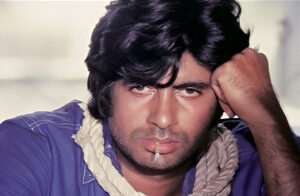
The seniors not aware of Amitabh’s Deewar wave, could not understand the meaning of his dialogue. What nonsense? The boy was not against the beating. But he cared for the hair style more than the mango or a beating. And saying useless mangoes!! Too surprising for the crowd!
Gurupada babu fumbled with words. Totally confused, he finally gave him two mangoes and let him go. He pondered on what a craze this tall lanky dusky angry young hero has created.
Fourth Story: The Exam Paper

It’s from that bygone era. Pre-social media pandemic period. Mofussil Bengal had those strong “para” culture. Everyone was known to each other in the locality. They used to fight amongst themselves and also survive together against the odds. Seniors were “Jethu, Kaku, Meso, Jethima, Masima …”. Neighbours had the freedom and fundamental rights to poke nose in your daily affairs and reprimand the juniors.
Bhola belonged to one such “para” in such period. He had his own principles of thinking. He was good in mathematics but very weak in languages, mostly in English. His parents were always worried about his exam period and the results. Bhola was then in class nine and entering the critical phase of high school studies. In his half-yearly exam, Bhola continued in his usual way. After the math exam, Bhola came back home, so happy he was after the examination. His parents assumed Bhola did well. His father took the question paper and started going through it. His brows were slowly becoming crooked. Bhola’s mother asked him – “What happened? Why are you upset?” Bhola’s father asked Bhola – “I can see that only half the questions are marked as answered. What happened to other half?” Bhola was playing cool in his own world. Hearing his father’s question, he smartly said – “Look Baba. Those are the comparatively difficult questions. I have answered them. So, I assume that Hari master will understand – as I could answer the difficult questions, surely the easier ones would have been a cake walk for me. So, why should I waste my time and my brain answering those easier lot?” It is learnt that Bhola’s father fainted hearing this answer and never ever made the mistake, looking at Bhola’s question papers in any subsequent years.
Fifth Story: Bhadralok
Chandrakanta Babu was an aged classic Bengali Vadralok. He used to work in foreign company (MNC term was not so popular during those days. And social media was like a journey to another galaxy). So, he was a revered person in locality. People could find him always clad in unstained milk white dhoti and shirt, with a matching coat over it, wearing polished pump shoe and carrying a black wooden umbrella. In winter, a shawl over his shoulder was the additional feature. It was a sight worth beholding. In the morning, when he used to go to the bus stand, people used to admire him for his work and attire.
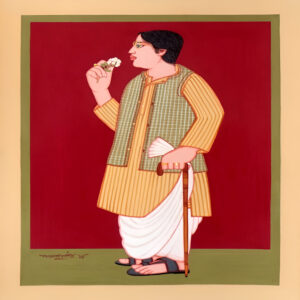
Bengali people are generally very proud of their prowess in language. And English is a language of the King. So, all vadralok used to speak in English. Hindi was another language which was a must as many of the labours and workers were fluent only in Hindi. But somehow, Hindi from a Bengali vadralok used to be nightmare to the listener. Speakers used to think that adding the word “hyay” to any Bengali sentence converts a Bengali word into Hindi.
One morning when Chandrakanta babu was marching in his measured style through a narrow lane from his home towards the bus stop, he found a thelawala pushing a cart with huge overload, and thus blocking Chandrakanta babu’s passage. Chandrakanta babu was in dilemma. Either he goes back, or stand alongside leaning on the building wall to allow the cart to move. If he opts for the second one, his immaculate dress would get stained. So, he could not decide. Then came out his feeling in Hindi – “Tumi kayse itna bara thela ei soru goli men dhukata hyay? Vaddarlok admi jabe ki kore? hyay?”
The thelawala was perplexed. Probably he was looking for an interpreter to understand Chandrakanta babu’s words. He could not say any word for quite some time. Just anticipating what the babu was saying, he pushed his cart towards the wall to make way for the vadralok to go in his normal walking style.
Sixth Story: Pisima
Atin, in his younger days, used to play seasonal games with his friends, in their local medium sized playground, which was surrounded by houses of the neighbourhood families.
That was the time when Asiad Delhi games was just around. TVs had started making inroads to Bengali dressing rooms of the well-to-do families. The whole of the para used to gather there for watching East Bengal – Mohun Bagan football or India West Indies cricket matches. Many enthusiastic could not get a space inside the house and had to satisfy themselves peeping through the windows.
Traditionally most of the older ladies in localities were respectfully called Masima or Pisima. There was a Pisima, very dear to all as she used to indulge young stars with fruits, achars, lozenges etc. On a fine afternoon cricket, the game had become very competitive. Batting team was running behind the targeted run-rate, and asking rate was in the rise. Suddenly one ball was hit by the anari batsman with his swinging bat and ball went high up. Fielders ran after the ball to catch, but it eluded all and jumped out of the field, and finally landed in Pisima’s compound, and slowly bounced inside the kitchen.
All players became tensed thinking it was impossible to retrieve the ball. Pisima used to follow the strict regimen of a widow. And a cricket ball with all dirt and filth of external world gone inside her kitchen. Anyway, with high hopes, Atin lead the boys to her house after jumping over the boundary wall and prayed to her to give the ball back.
She observed all and thought for some time. Then she told the boys which translates into– “I have seen cricket matches in TV. Famous players play and they hit balls out of field. But till date, no ball has come to my kitchen. How you naughty boys could do what the famous players could not?”
Atin and his group was stuck dumb. Had no answer and backtracked without the ball.
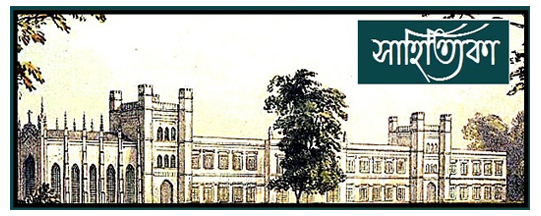
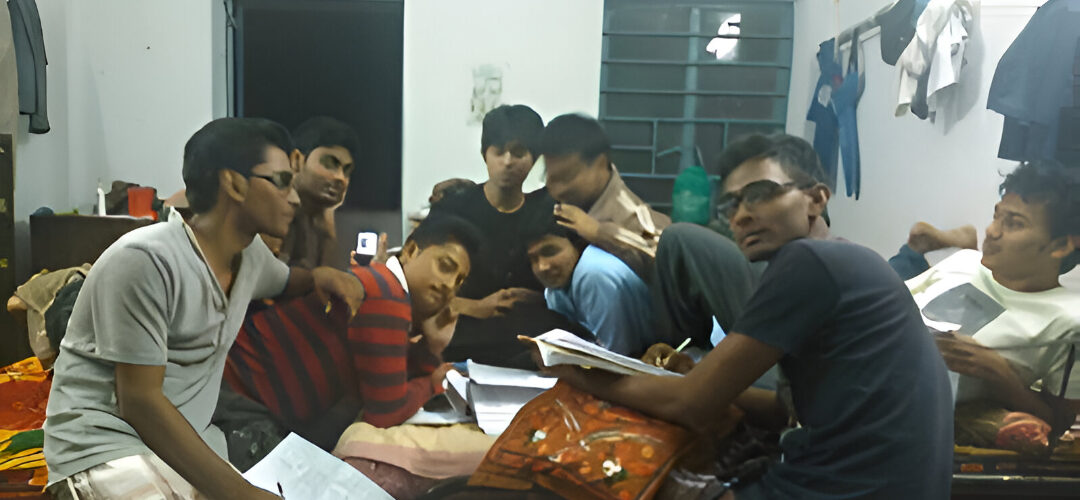

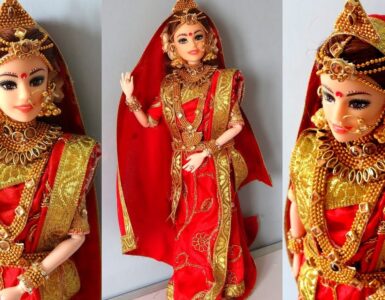
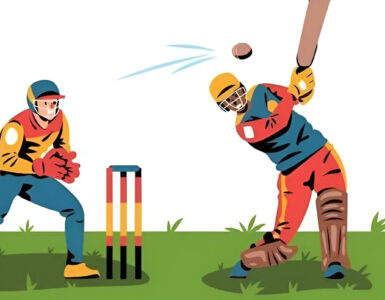










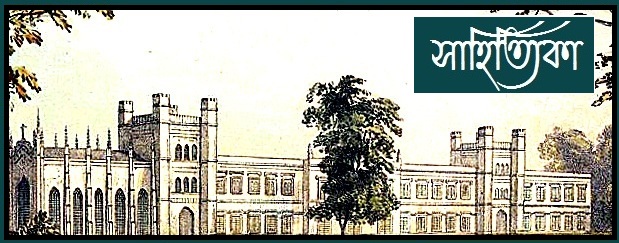
Add comment